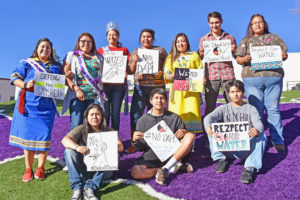
Margaret McKinney/Highlands University
Members of the Native American Club at Highlands University gather Nov. 15 to show their support for the Standing Rock protest against the Dakota Access pipeline.
Las Vegas, N.M. – Students in the Native American Club at Highlands University stand in solidarity with the Standing Rock protest over the Dakota Access pipeline with a fundraiser of canned food and winter clothes for the protesters.
Since August, members of the Standing Rock Reservation in North Dakota and other Native American tribes from across the country have gathered in an effort to stop the section of the oil pipeline that crosses the Standing Rock Reservation.
“The construction of this Dakota Access pipeline is destroying sacred sites, burial grounds and other places of cultural significance,” said Lenaya Martínez, Highlands’ Native American Club president. “Water is life, and this pipeline will jeopardize this critical natural resource.”
One segment of the Dakota Access project calls for drilling under Lake Oahe to build the pipeline. The Missouri River is a tributary to the lake, which is a water source for the the Standing Rock Reservation. The reservation is home to the Sioux and other tribes.
“There are hundreds of people at Standing Rock who are camping out, cooking meals, and dealing with the harsh weather while protesting. Some of these individuals are being physically assaulted and arrested for protecting their rights to these Native American lands in Indian Country,” Martínez, 21, said.
She is a criminal justice senior and member of the Okhay Owingeh and Jicarilla Apache tribes in New Mexico.
The Native American Club initiated the fundraiser Nov. 11. It concludes Nov. 18, at the end of Native American Week at Highlands. The canned foods and winter clothing will be transported to Standing Rock as a Thanksgiving package.
Donations may be dropped off at the Native American Lounge, Student Union Building, Room 308, 800 National Ave.
Sam Proper of the Navajo Nation is another Native American Club member working on the fundraiser.
“The Standing Rock protest is important to me because they aren’t just standing for water, but also for our way of life as Native Americans,” said Proper, a 21-year-old criminal justice senior. “The limited media attention to this peaceful protest is frustrating. I think it’s ridiculous that military tactics are being used to suppress this peaceful protest on sacred Native American lands.”
Meanwhile, Nov. 15 was a national day of action against the Dakota Access pipeline, with protests from coast to coast. At Highlands, languages and culture professor Eric Romero and students in his Chicano Experience class also showed their support for the protest Nov. 15.
Energy Transfer Partners is financing the Dakota Access pipeline. According to the company, the $3.8 billion project would transport 470,000 barrels of oil a day across four states. The oil would flow from oil fields in Stanley, North Dakota, near the Canadian border, to Patoka, in Southern Illinois, where it would link with other existing pipelines.
The U.S. Army Corps of Engineers is reviewing the permits for the oil pipeline.
Julia Geffroy is the new Native American Center coordinator at Highlands. She is a member of the the Picuris Pueblo in New Mexico.
“The students’ Standing Rock fundraiser promotes both environmental awareness and environmental justice issues on native lands,” Geffroy said.
She said approximately 266 Native Americans students attend Highlands University, with 82 at the main campus in Las Vegas.
For more information about the fundraiser for Standing Rock, contact Martínez at lenayamartinez10@gmail.com.
